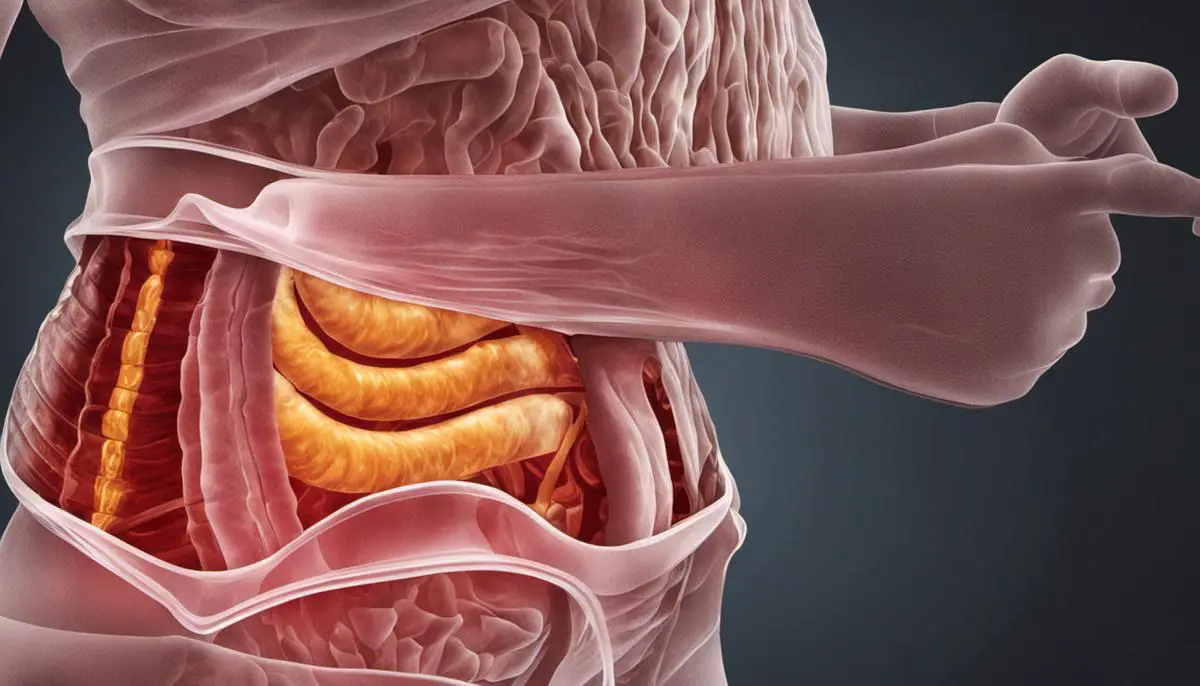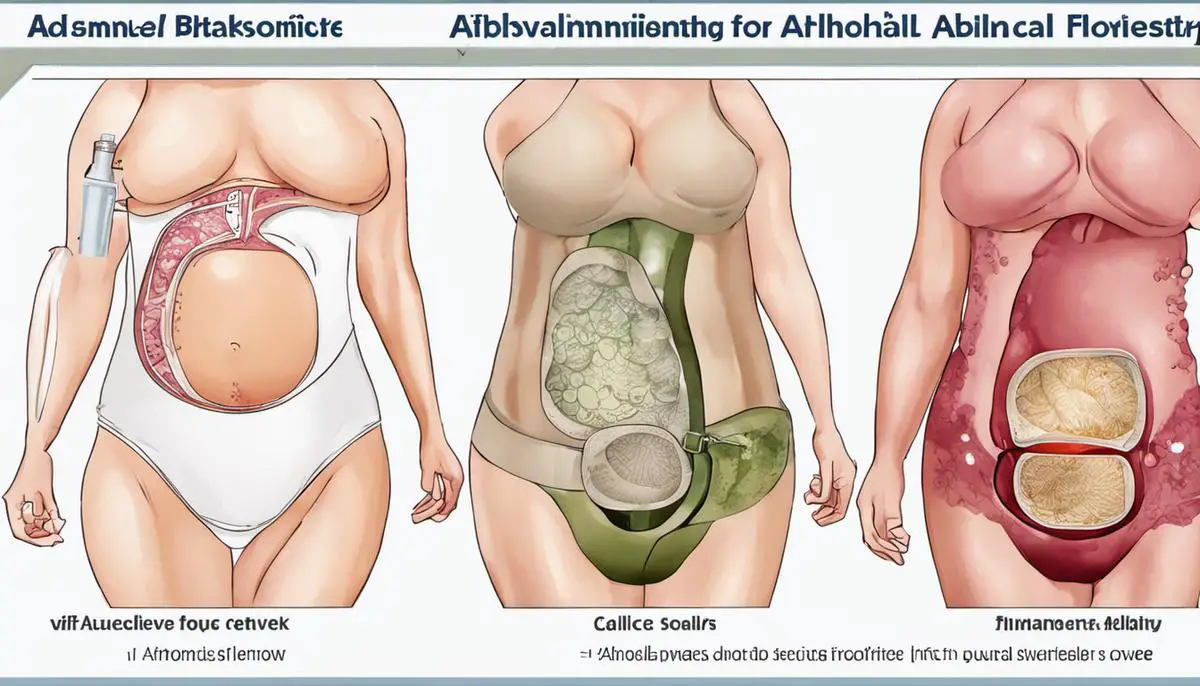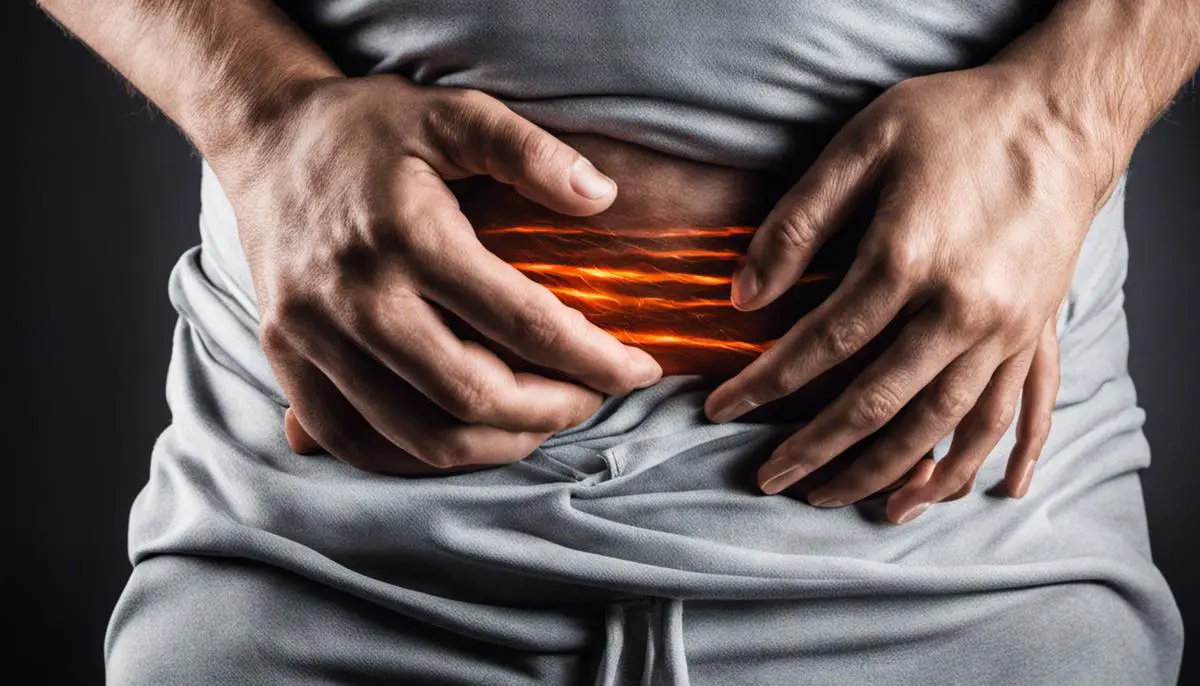Abdominal bloating, a discomfort experienced by many, can escalate to a severe level, causing alarmingly distended appearance and significant pain. This blog post serves as an informative guide designed to offer an in-depth understanding of severe abdominal bloating – its causes, symptoms, and related health conditions. With a dual objective of enhancing knowledge and promoting health and wellness, the write-up delves into how professionals diagnose this condition. It doesn’t stop there; it systematically walks you through various treatment options, helping you explore the possibilities available for addressing this concern. Lastly, it suggests lifestyle modifications and home remedies, which could potentially reduce symptoms or the likelihood of abdominal bloating. Remember, knowledge is the first aid in health management. Let’s begin our journey towards better gut health.
Understanding Severe Abdominal Bloating
Understanding Severe Abdominal Bloating
Severe abdominal bloating refers to a physical swelling or increase in the diameter of the abdominal area. It usually brings about a feeling of fullness or tightness in the belly, often accompanied by pain and discomfort. Instances of abdominal bloating can range from mild and almost unnoticeable to severe, impacting the quality of life and daily activities of those affected.
Common Causes
There is a wide array of factors that can cause or worsen abdominal bloating. It can arise due to digestive disorders, such as irritable bowel syndrome (IBS), Crohn’s disease, gastroesophageal reflux disease (GERD), and constipation. Additionally, it can be a side effect of gas buildup which occurs when one swallows air or fails to fully break down food in the gut. Certain food types and beverages, primarily those high in fats and fiber or carbonated drinks, can also contribute to bloating.
Hormonal changes like those experienced during a woman’s menstrual cycle can also cause bloating. Less common causes include physical obstructions in the bowel, such as polyps or tumors, and specific diseases like liver disease or congestive heart failure.
Symptoms Accompanying Severe Abdominal Bloating
Not only does severe abdominal bloating lead to a pronounced swelling of the stomach, but it also typically pairs with other uncomfortable symptoms. These signs can include pain, excessive gas or flatulence, gurgling or rumbling sounds in the belly, and a change in bowel habits. Symptoms such as hard and infrequent stools, diarrhea, or mucus in the stool are common. Some individuals also report experiencing heartburn, vomiting, weight loss, fever, or bloody stools – strong indicators to seek immediate medical attention.
Related Health Conditions
People who experience frequent severe abdominal bloating may also suffer from other underlying health conditions. These can include food intolerances or allergies, such as celiac disease or lactose intolerance, and gastrointestinal disorders like gastritis, peptic ulcer disease, and diverticulitis. Women may also experience bloating due to endometriosis, ovarian cysts, or uterine fibroids. More severe conditions that can cause bloating include liver disease, kidney failure, and certain types of cancer.
Managing Severe Abdominal Bloating
Addressing severe abdominal bloating often involves identifying and treating the underlying cause. The solution can vary significantly depending on this cause, yet might commonly include dietary modifications aimed at decreasing gas production. For instance, avoiding foods known to produce gas or slowly increasing your fiber intake may be beneficial. In some instances, adjusting current medications or introducing new ones such as antacids, probiotics, or antibiotics may be necessary.
Employing certain lifestyle alterations such as regular moderate exercise can assist in moving gas through your digestive system. Mindful eating practices can also aid in reducing the amount of air swallowed during meals. In particularly severe instances, surgical interventions might be needed. These could range from removing blockages, tumors, or cysts to more intricate procedures to combat conditions like cancer.
Lastly, for those dealing with chronic conditions leading to bloating, continuous medical oversight and routine follow-ups are vital. Through these regular check-ups, adjustments to treatment plans can be made promptly, contributing to more effective symptom control and ultimately improving the overall quality of life.

Diagnosing Severe Abdominal Bloating
Decoding Abdominal Bloating
Abdominal bloating is a symptom where the abdomen feels tight or full, frequently resulting in a visibly swollen or distended appearance. This uncomfortable bloating can be severe enough to cause genuine pain and reduce one’s quality of life. Various factors can instigate this condition, spanning from mild digestive problems to more severe health complications.
Diagnostic Methodologies
To comprehensively diagnose severe abdominal bloating, healthcare providers employ a combination of physical examinations, medical history, dietary and lifestyle inquiries, and diagnostic tests. These procedures are designed to provide a holistic view of the patient’s condition and to pinpoint the underlying cause behind the uncomfortable bloating.
Physical Exams
Physical examinations are akin to a preliminary investigation. This involves the doctor palpating or feeling the abdomen, pinpointing tender areas, and discerning if the stomach is hard or soft. This can reveal signs such as distension or enlargement of the abdomen, and help detect whether pain is localized or widespread.
Medical History and Lifestyle Inquiries
Additionally, healthcare providers will typically ask about your medical history, eating habits, and lifestyle. They may ask questions like:
- How long have you been experiencing bloating?
- How often does it occur?
- Do specific foods or activities seem to trigger it?
- Have you noticed any other symptoms alongside the bloating, like weight loss or frequent heartburn?
These questions help paint a picture of what might be causing the bloating and provide clues on how to address it.
Diagnostic Tests
If the cause is not readily discernible from the physical exam and query, diagnostic tests are employed. This could range from blood tests to rule out diseases like celiac or inflammatory bowel disease, to imaging tests like abdominal ultrasounds which can detect issues like ovarian cysts, tumors, or obstructions. In certain cases, gastrointestinal studies using barium or gas may be considered to examine the movement and shape of the gut more closely and detect abnormalities.
In some instances, especially when a food intolerance or allergy is suspected, your doctor might recommend keeping a food diary to track what you eat and when your symptoms flare up. This can provide valuable data to help determine if your severe abdominal bloating is related to diet.
Importance of Early Consultation
Remember, if you experience prolonged, severe abdominal bloating, it’s important not to dismiss it as simple indigestion. The bloating may be a symptom of a more serious underlying health condition, such as liver disease or ovarian cancer. Therefore, it’s crucial to consult with a healthcare professional and undergo the necessary examinations to reach a proper diagnosis and treatment. This ensures that you can effectively manage the condition, reducing your risk of complications, and potentially drastically improving your quality of life.
Treatment Options
The treatment for severe abdominal bloating is largely contingent on what the underlying cause is determined to be. Depending on your individual health condition and the causes behind the bloating, your doctor may recommend lifestyle changes, like dietary adjustments or exercise. In cases where the bloating occurs due to a specific health condition, medication or even surgery may be recommended. Keep in mind that your treatment plan will be unique to you and your health needs.
The emerging trend of telemedicine holds promising benefits for individuals seeking treatment for severe abdominal bloating. Particularly in the midst of persistent pandemic protocols, the use of online consultations, digital health tracking tools, and remote patient monitoring can be quite convenient and effective.

Medical Treatments Available for Severe Abdominal Bloating
Treatment Possibilities for Severe Abdominal Bloating
The options for treating severe abdominal bloating are varied, each addressing different potential causes of the condition. These treatments are selected on the basis of a thorough diagnosis, which in turn is determined through extensive tests and evaluations.
Lifestyle Changes and Natural Remedies
Often, abdominal bloating can be managed through lifestyle changes and natural remedies. A diet low in fructose, lactose, fructans, galactans, and polyols can help alleviate symptoms, as these sugars can be hard to digest and promote gas buildup. Probiotics, whether in supplement form or from foods like yogurt, kefir, and kombucha, contribute to a healthier gut flora and improve digestion. Regular exercise and sufficient hydration can also enhance gut function and reduce bloating.
Medication
If lifestyle changes and natural remedies aren’t enough, various medications can help treat severe abdominal bloating. Over-the-counter treatments include antacids and simethicone, which alter the surface tension of gas bubbles, helping them to combine and exit the body more easily. Alpha-galactosidase supplements, such as Beano, can reduce gas production from certain foods. Prescribed medications might include antibiotics, if an infection is the cause, or drugs that slow the production of stomach acid, like proton pump inhibitors.
Behavioral Therapies
Some individuals may find relief from severe abdominal bloating through gut-directed hypnotherapy or cognitive-behavioral therapy. These types of treatments can help patients better understand and manage their symptoms.
Surgical Treatments
In rare cases, where bloating is a symptom of a larger health issue such as a bowel obstruction or hernia, surgery might be recommended. The specific type of operation will depend on the underlying condition causing the severe bloating.
Effectiveness, Potential Side Effects, and Result Timeframes
Treatment for severe abdominal bloating must be accurate in determining the root cause to ensure its efficacy. Immediate relief can be provided by medications such as antacids, whereas dietary changes may need a few weeks to take effect. The common side effects of these treatments may include constipation and dry mouth. However, antibiotics may disrupt gut microbiota.
It’s important to understand that treating severe abdominal bloating often necessitates patience and a trial-and-error process. Different individuals may respond differently due to unique body chemistry, gut flora, and the underlying causes of their bloating. To monitor progress and fine-tune the treatment regimen as needed, it’s vital to maintain regular appointments with a healthcare provider.

Lifestyle Changes That Can Help Manage Severe Abdominal Bloating
Adjusting Your Diet
One of the most effective ways to control severe abdominal bloating is making adjustments to your diet. Certain foods like beans, lentils, broccoli, cabbage, onions, and carbonated drinks can produce gas in the digestive system, which can cause bloating. Along the same lines, some individuals might have specific intolerances to certain food components such as lactose or gluten, which can also lead to bloating. As a consequence, tracking your daily intake with a food diary may help you pinpoint which foods trigger your discomfort.
Probiotics and Dietary Supplements
Incorporating probiotics into your diet may improve digestion and reduce bloating. Probiotics are live bacteria and yeasts that benefit the gut health. They can be incorporated into your diet through fermented foods like yogurt, sauerkraut, and kimchi, probiotic supplements, or beverages such as kefir and kombucha. Additionally, dietary enzymes can help break down certain food substances to enhance digestion and reduce bloating.
Physical Activity
Regular exercise can play a key role in managing digestive health. It encourages the passage of gas through the digestive system, improves overall metabolic function, and alleviates stress, which can contribute to bloating. Incorporating at least 30 minutes of moderate activity, like brisk walking, swimming, or cycling, into your routine every day can help maintain a healthy digestive system.
Stay Hydrated
Dehydration can lead to constipation and bloating. Therefore, keep yourself hydrated by drinking an adequate amount of water daily. Consuming foods with high water content like cucumber, watermelon, and celery can also contribute to your daily hydration.
Mindful Eating
Eating too quickly, overeating, or talking while eating can cause you to swallow air, leading to bloating. Practice mindful eating by chewing your food slowly and thoroughly, which can aid in digestion and prevent air from getting into your stomach. Avoid overeating by portioning your meals and eating smaller, more frequent meals instead of three large ones.
Avoid Smoking and Drinking
Both smoking and excessive alcohol consumption can negatively impact your digestive health, leading to issues such as bloating. Quitting smoking and limiting alcohol consumption are beneficial lifestyle changes for improving gut health.
Reduce Stress Levels
High levels of stress can interfere with your digestive system and cause bloating. Incorporate stress management techniques like yoga, meditation, or deep-breathing exercises into your routine to reduce stress levels and improve overall gut health.
Before implementing any significant lifestyle changes
it’s essential to consult with a healthcare provider, especially for individuals dealing with chronic bloating. It’s important to rule out underlying digestive disorders like irritable bowel syndrome (IBS), inflammatory bowel disease (IBD), or gastroesophageal reflux disease (GERD), that can also cause severe abdominal bloating.

Living with severe abdominal bloating can be an arduous and isolating experience. However, it does not have to define your quality of life. With a thorough understanding of the condition, along with insights into diagnosis and treatment options, you can be better prepared to navigate your health journey. Additionally, lifestyle adaptations can play a pivotal role in symptom management and prevention. It’s time to take control, armed with information, and work towards relief and improved gut health. Every small change and effort makes a difference. Be proactive about your health, and remember, it’s never too late to start. Stay healthy, stay informed.
